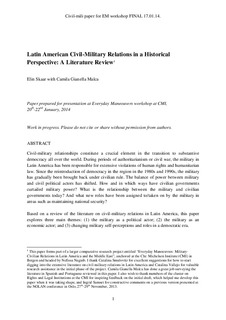| dc.contributor.author | Skaar, Elin | |
| dc.contributor.author | Malca, Camila Gianella | |
| dc.date.accessioned | 2018-01-04T08:19:42Z | |
| dc.date.available | 2018-01-04T08:19:42Z | |
| dc.date.issued | 2014-01-27 | |
| dc.identifier | oai:www.cmi.no:5035 | |
| dc.identifier.citation | Paper prepared for presentation at Everyday Maneouvers workshop at CMI, 20th-22nd January, 2014 | |
| dc.identifier.uri | http://hdl.handle.net/11250/2475029 | |
| dc.description.abstract | Civil-military relationships constitute a crucial element in the transition to substantive democracy all over the world. During periods of authoritarianism or civil war, the military in Latin America has been responsible for extensive violations of human rights and humanitarian law. Since the reintroduction of democracy in the region in the 1980s and 1990s, the military has gradually been brought back under civilian rule. The balance of power between military and civil political actors has shifted. How and in which ways have civilian governments curtailed military power? What is the relationship between the military and civilian governments today? And what new roles have been assigned to/taken on by the military in areas such as maintaining national security?
Based on a review of the literature on civil-military relations in Latin America, this paper explores three main themes: (1) the military as a political actor; (2) the military as an economic actor; and (3) changing military self-perceptions and roles in a democratic era. | |
| dc.language.iso | eng | |
| dc.relation.uri | https://www.cmi.no/publications/5035-latin-american-civil-military-relations-in-a | |
| dc.subject | Latin America | |
| dc.subject | Civil-Military Relations | |
| dc.subject | South and Central America | |
| dc.title | Latin American Civil-Military Relations in a Historical Perspective: A Literature Review | |
| dc.type | Conference object | |
